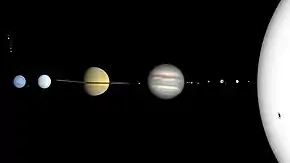Lists of planets
A planet is a large, rounded astronomical body that is neither a star nor its remnant. The best available theory of planet formation is the nebular hypothesis, which posits that an interstellar cloud collapses out of a nebula to create a young protostar orbited by a protoplanetary disk.
In the Solar System
 |
| Objects |
|---|
| Lists |
| Planets |
|
|
- For a list of geophysical planets in the Solar System, see: List of gravitationally rounded objects of the Solar System This also includes a list of the eight planets according to the IAU definition.
- For a list of objects in the Solar System once but no longer generally considered planets, see: List of former planets
- For a list of objects in the Solar System, including planets, that have been or are believed to exist, but either have not been proven or have been disproven, see: List of hypothetical Solar System objects
Outside the Solar System
- Exoplanets
- Extrasolar systems
- List of multiplanetary systems
- List of exoplanets discovered using the Kepler space telescope
- List of stars with proplyds
- List of rogue planets
- Exoplanets by method of detection
- List of exoplanets detected by radial velocity
- List of transiting exoplanets
- List of exoplanets detected by microlensing
- List of directly imaged exoplanets
- List of exoplanets detected by timing
- Records in exoplanet detection
- Potential terrestrial exoplanets
Fictional or non-scientific planets
- For a list of planets as used in astrology, see: Planets in astrology
- For a list of supposed planets not based on scientific evidence, see: Planetary objects proposed in religion, astrology, ufology and pseudoscience
- For a list of planets in fiction, see: Planets in science fiction, Stars and planetary systems in fiction and Fictional planets of the Solar System
Mixed
- List of planet types (etymologically accepting of multiple categories)
See also
- Lists of astronomical objects
- Classical planet
- Definition of planet
- List of exoplanet search projects
This article is issued from Wikipedia. The text is licensed under Creative Commons - Attribution - Sharealike. Additional terms may apply for the media files.
